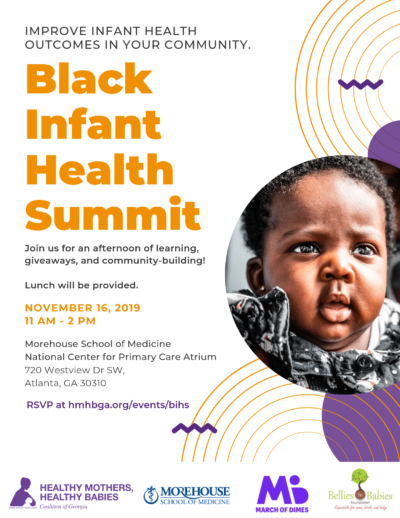Johnecia Mason’s pregnancy was going along fine until at six months, she developed preeclampsia, a complication characterized by high blood pressure.
Soon afterward, her son was born prematurely, at 26 weeks, weighing just 1 pound, 8 ounces. He died in the hospital 12 days later.

“It was very hard,’’ Mason says now. “He was our first child. It is nothing that you expect to deal with. It changes you forever.’’
Mason, a Covington resident and a business professor at Georgia Piedmont Technical College, has another son now. He was also born preterm but is healthy today.
She has turned her maternity experience into community service as board president of the nonprofit Healthy Mothers, Healthy Babies Coalition of Georgia. A big focus for Mason is increasing access to care for Georgians, especially women of color.
Preterm births have been an increasing problem for Georgia.
In fact, a recent report card on infant and maternal health gave Georgia a failing grade for its preterm birth rate.
The March of Dimes report, released this month, said the 2018 preterm rate in Georgia ticked up to 11.5 percent of births. The percentage has been steadily increasing, and the new figure moved Georgia to an “F’’ after years of “D” grades. Georgia was ranked 45th among the 50 states.
Nationally, more than 380,000 babies are born preterm, meaning too early, before 37 weeks of pregnancy have elapsed.
Preterm birth is the largest contributor to infant death. And babies who survive an early birth often face serious and lifelong health problems, including breathing problems, jaundice, vision loss, cerebral palsy and intellectual delays. Preterm birth accounts for more than $26 billion annually in avoidable medical and societal costs, according to the National Academy of Medicine.
Factors causing preterm births include a lack of health insurance, as well as limited access to supportive care before, during and after pregnancy. The health of the pregnant woman and whether she has conditions such as hypertension or diabetes is another factor, health officials say.

If a woman has already had a preterm birth, she stands a greater chance of having another one. Intervals between pregnancies also make a difference. Georgia mothers who have less than one year of spacing between delivery and the next pregnancy have a higher preterm birth rate.
Access to obstetrical care also is a problem in Georgia.
Longer distances to birthing hospitals can increase chances for preterm birth. But currently, only 59 of Georgia’s 159 counties have labor and delivery units, with about 75 hospitals in the state routinely delivering babies, the Georgia OBGyn Society said last year.
The report card shows that overall preterm births worsened in 30 states. Other states getting an “F” grade were Arkansas, Louisiana, Mississippi, Alabama and West Virginia.
“Every American should be alarmed about the state of maternal and infant health in this country, because it is an issue that touches each one of us. This is one crisis, not two. The health of moms and babies is powerfully linked, and we need to start treating it as such,” Stacey Stewart, president and CEO of March of Dimes, said in a recent statement.

Six Georgia counties received grades for their preterm birth rates in the report. The highest grade was for Gwinnett, with a “C-’’ from its preterm rate of 10.1 percent. Among other metro Atlanta counties, DeKalb and Cobb received a “D+’’ while Fulton got a “D-’’ and Clayton an “F.’’ The coastal county of Chatham also rated an “F.’’
The city of Atlanta received an “F.”
The report says that among developed nations, the United States is among the most dangerous in which to give birth. Besides the increasing rates of preterm birth, 22,000 babies die in the U.S. each year.
There are significant disparities in the infant health rates along ethnic and racial lines, both here and nationally.
“Black infant mortality is twice as prevalent as it is for white infants in Georgia,’’ said Elise Blasingame, executive director of Healthy Mothers, Healthy Babies Coalition of Georgia. “It is not surprising to see this outcome for our state’s infants when our maternal health outcomes are so poor. It’s hard enough to take care of baby when mom is healthy, let alone when she is not getting the care she needs.’’
The rates of maternal death and severe pregnancy complications also are “unacceptably high,’’ the report says.
Georgia’s maternal mortality rate is at the top among states, an issue that has drawn attention in the Georgia General Assembly. A legislative study committee is exploring ways to reduce maternal deaths by preventing problems that cause them.

Black women in Georgia are at least three times more likely to die during or after pregnancy than their white counterparts.
More than half of Georgia’s births are covered by Medicaid.
“Those moms are being kicked off coverage 60 days from the date of delivery,’’ Blasingame said. “The state really needs to look at extending the length of coverage to address these poor maternal and infant health outcomes.”
The Georgia Maternal Mortality Review Committee recommends extending Medicaid coverage up to one year to ensure that medical and behavioral health conditions can be managed and treated before they become progressively severe or the woman becomes pregnant again, or both.

“The health of moms and babies in Georgia must be a priority issue for all of us,” said Danielle Brown, director of maternal child health and NICU [Neonatal Intensive Care Unit] innovation for March of Dimes Georgia. “By working together, as individuals and across the public and private sectors, we can make significant changes that can give every mom the care she deserves and every baby the best possible start.”
In collaboration with Morehouse School of Medicine and Healthy Mothers, Healthy Babies, the March of Dimes is hosting a Black Infant Health Summit this Saturday at Morehouse. The summit will provide education on infant health issues, including reducing prematurity and low birth weight and infant mortality. The training includes a focus on providing faith-based organizations and prominent fraternities and sororities in Atlanta with evidence-based tools to empower their parishioners and members.
Mason would like to see substantial improvements in access to care and health education, and progress on the report card.
“I’d like to see the state of Georgia get an ‘A,’ ’’ she says.

